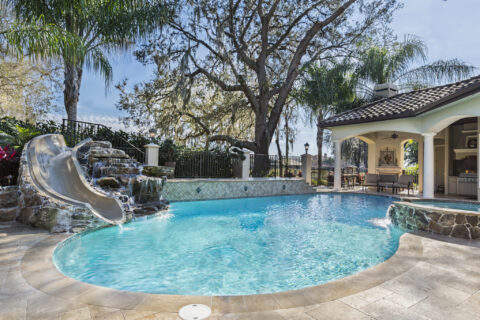Optimizing Salt Cell Performance: Dos and Don’ts for Lifespan Longevity
As anyone who has experienced the comfort and convenience of a saltwater swimming pool can tell you, it’s worth it! But to make sure that your salt cell continues to efficiently produce chlorine—essential to keeping your pool clean and free of harmful bacteria—you need to take care of it like any other valuable asset. At All Seasons Pools Spas Inc., we want our customers in Orland Park, IL to get the most out of their salt cells for years to come, so here are some do’s and don’ts when it comes to perfecting your salt cell performance.
What Are Salt Cells?
Salt cells are a critical component of a saltwater pool’s filtration system. They produce chlorine from salt to sanitize the pool water. Salt cells are typically installed in the pool’s equipment and contain metal plates that use an electrical current to break down the sodium molecules in the salt, as well as hydrogen and oxygen in the pool water itself, creating chlorine. Some salt cells use titanium plates, while others use a combination of metals. The amount of chlorine produced by the salt cell is controlled by the pool’s electronic control panel or timer.
How Do Salt Cells Work?
 When salt cells produce chlorine, they pass a weak electrical current over metal plates in the cell. As the current passes over the plates, it breaks down the salt molecules present in the water into their two components: sodium and chlorine. Once separated, the chlorine is used to sanitize the pool water, while the sodium combines with other elements to reform salt. This process ensures a continuous supply of chlorinated water without the need for traditional chlorine tablets or daily additions of liquid or granular chlorine products.
When salt cells produce chlorine, they pass a weak electrical current over metal plates in the cell. As the current passes over the plates, it breaks down the salt molecules present in the water into their two components: sodium and chlorine. Once separated, the chlorine is used to sanitize the pool water, while the sodium combines with other elements to reform salt. This process ensures a continuous supply of chlorinated water without the need for traditional chlorine tablets or daily additions of liquid or granular chlorine products.
Why Are Salt Cells Vital to Your Saltwater Pool?
Salt cells are vital to the maintenance of your saltwater pool’s chemistry and cleanliness. They produce a steady supply of chlorine, which helps to reduce the risk of waterborne illnesses and algae growth. Additionally, salt cells require only occasional maintenance and last longer than traditional chlorine treatments, which can save you time and money in the long run. Since they are creating and feeding chlorine into the pool anytime your filter system is operating, without the need to remember to fill containers with chlorine products, or manually add them by hand, it makes pool ownership much easier.
Maintenance and Replacement of Salt Cells
Like all pool equipment, salt cells require regular maintenance to maintain their performance and lifespan. It is essential to clean the salt cell regularly, as calcium buildup can reduce its efficiency. In some cases, the cell may need to be replaced. Signs that your salt cell plates need replacement may include frequent error messages on your pool’s control panel, low chlorine levels, or sluggish water circulation.
Do’s: Check the salt cell regularly
Your salt cell plays a vital role in your pool’s operation. Its primary function is to convert salt to chlorine, which sanitizes your pool. It would be best if you check your cell regularly to ensure that it is not corroded or damaged. We recommend you inspect it once a month and consult your pool service provider if you notice any discrepancies. Moreover, you should clean it once every three months even if you don’t see buildup, to help avoid scaling and to remove microscopic buildup that might not be visible to the naked eye. We also recommend the routine addition to the pool water of specialized sequestering products which help protect the salt cell.
Don’ts: Don’t Turn Off the Pump for an Extended Period
Your pool pump is the core component that circulates water, providing the necessary flow rate to activate the salt cell. If you turn off the pump for a prolonged period, chlorine levels in your pool will drop significantly, allowing bacteria and algae to grow. Additionally, stagnant water in pipes can also lead to algae growth and other bacteria in your pool, which is not ideal.
Do’s: Proper Water Chemistry
The water chemistry of your pool significantly affects your salt cell’s performance. We suggest you maintain pH levels between 7.4 and 7.6 to ensure optimum efficiency. Higher pH levels can cause scaling and cloudiness, while lower levels can damage your equipment.
Don’ts: Adding Salt Unnecessarily
Adding too much salt to your pool can damage your cell and be cost-ineffective. Salt should be added according to the salt system manufacturer’s guidelines to maintain the required level of salinity. Please don’t add salt to the skimmer. It should only be added directly into the pool. Brushing after it’s added can help dissolve the salt more rapidly, especially in colder water. Finally, only use high quality swimming pool salt from a trusted supplier, like All Seasons. We carry only the highest grade pool salt, which is food grade! You should never use lesser quality salts and especially never use water softener salt, as they aren’t pure, can cause damage to your equipment and staining to your pool.
Do’s: Regular Inspection
Finally, we recommend scheduling an annual inspection by a pool service technician to keep your equipment operating at peak efficiency. They possess the expertise, tools, and training to ensure your pool’s safety and longevity. With this, you can be assured that your pool is in the best possible condition.
Schedule a Salt Cell Evaluation in Orland Park Today!
Taking the necessary steps to protect salt cell performance can ensure longevity and save time and energy. Maintenance tasks like brushing the electrode plates, keeping tabs on pH & temperature levels, and regular cleaning or replacement of the system are essential to optimize salt cell performance. If you’re ever unsure of what proper steps to take for maintenance or find yourself in need of repair or replacement, contact All Seasons Pools Spas Inc. in Orland Park, IL at 708-349-2222. With the right care and support your salt cell should enjoy a good service life and provide great balance & clarity for years to come!


